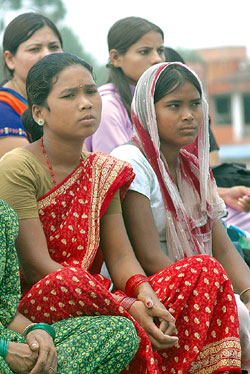|
|
Men work harder and produce more, women are weaker and take longer to do anything. So pay the woman less.
These are prevailing beliefs that shape the reality of millions of female Nepali workers, who have always been paid less than their male counterparts for the same amount and quality of work.
"This will change now and we won't stop until justice is served," says Kailali activist Sapana Bhandari who with dozens of other female wage labourers travelled to Kathmandu to file a case at the Supreme Court on Thursday.
The women from eight western districts want the court to order the government to introduce a special law providing equal wages for female workers. Activists say they need the law to fight legal battles against employers.
Bhandari and her colleagues are determined to put up a fight until the parliament acts. On Thursday, they led activists and workers from Kailali, Chitwan, Bardia, Banke, Kapilbastu, Nawalparasi and Surkhet in a protest near Singha Durbar, blocking traffic for 15 minutes to attract the attention of Kathmandu. (SEE PIC)
The minimum wage for male labourers is Rs 100-150 but no more than Rs 80 for women, and the rate has been frozen for the last 10 years. The 1990 constitution has several laws that protect rights and promote gender equality but there is still no law that gives a female worker the right to approach the courts to demand equal pay.
Many female workers in both urban and rural areas have failed to get compensation after filing complaints in district courts. In Kailali, Bhandari had for many years approached the CDO, LDO, and other officials to raise the issue with the central government. They even went to trade unions and local party leaders but nobody paid much attention. A case filed by a female construction worker in Kailali two months ago is gathering dust in the CDO office.
"We are not asking that we should have every right as men but this is such gross discrimination," says activist Bishnu Maya Pande from Chitwan.
For the activists this is not merely an issue of daily wage labourers, but will open doors to address issues of female workers in every sector-construction, farming, factories, stone quarries, brick kilns, domestic work and others. "Male workers are now fully backing us in our struggle," says Bhandari who has fought for equal pay for four years often battling apathy.
At a time when the parties and Maoists are preparing for summit talks and all sectors of society are discussing a constituent assembly, the women activists say this is the right time to raise their voices. In late May, parliament ended discrimination against women in granting citizenship and pledged to reserve 33 percent of civil service jobs for females. Says activist Goma Acharya from Kailali's Women's Advocacy Group: "We must strike when the iron is hot."



